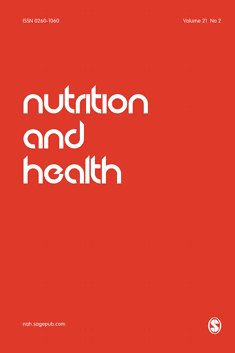
NUTRITION AND HEALTH
Scope & Guideline
Connecting Nutrition and Health for a Brighter Future
Introduction
Aims and Scopes
- Nutrition and Health Interventions:
The journal publishes research on various nutritional interventions aimed at improving health outcomes in different populations, including children, adults, and vulnerable groups. This includes studies on dietary supplements, specific diets (like Mediterranean or low-carbohydrate), and community-based nutrition programs. - Public Health and Nutrition Policy:
Research that explores the intersection of nutrition and public health policies, including food security, nutrition education, and the socioeconomic determinants of dietary choices. This area aims to address malnutrition and promote healthy eating at a community and population level. - Psychosocial and Behavioral Aspects of Eating:
The journal includes studies investigating the psychosocial factors influencing dietary behaviors, such as self-compassion, mindful eating, and the impact of social support on food choices. Understanding these aspects helps in designing effective nutrition interventions. - Nutritional Epidemiology:
A significant focus is on understanding the relationship between dietary patterns and health outcomes through epidemiological studies. This includes examining the prevalence of dietary-related diseases and the impact of dietary diversity and quality on overall health. - Cultural and Environmental Influences on Nutrition:
Research that delves into how cultural practices, food environments, and lifestyle transitions affect nutritional habits and health, particularly in diverse and underserved populations.
Trending and Emerging
- Impact of COVID-19 on Nutrition:
A significant increase in research exploring how the COVID-19 pandemic has affected dietary behaviors, food security, and health outcomes. This trend underscores the urgent need to understand the pandemic's long-term implications on nutrition and public health. - Mindful Eating and Behavioral Interventions:
There is a growing interest in the role of mindful eating and behavioral approaches to improve dietary habits and health outcomes. Research focusing on the psychological aspects of eating behaviors is becoming more prevalent. - Nutrition and Mental Health:
Emerging studies are increasingly examining the connection between diet and mental health, including the effects of dietary patterns on mood, anxiety, and cognitive function. This reflects a broader recognition of the importance of nutrition in overall mental well-being. - Food Security and Nutrition Equity:
Research focusing on food security, particularly in marginalized and low-income populations, is on the rise. This trend emphasizes the need to address nutritional disparities and improve access to healthy foods. - Technological Innovations in Nutrition Assessment:
Emerging themes include the use of digital tools and technologies for dietary assessment and intervention, reflecting the increasing integration of technology in nutrition research and practice.
Declining or Waning
- Traditional Dietary Practices:
Research on traditional dietary practices has seen a decline, possibly due to the increasing globalization of food systems and the rise of Western dietary patterns. Studies that previously focused on traditional diets are now less frequent, as attention shifts toward modern dietary influences. - Single Nutrient Focus:
There has been a noticeable reduction in studies that focus solely on single nutrients (e.g., vitamin D, omega-3 fatty acids) without considering the broader context of dietary patterns. The trend is moving towards a more holistic view of nutrition that emphasizes whole foods and dietary diversity. - Longitudinal Studies on Diet Quality:
Longitudinal studies assessing long-term dietary quality and its effects on health outcomes are appearing less frequently. The focus has shifted towards more immediate impacts of dietary changes and interventions, possibly due to the urgency in addressing public health crises. - Food Processing and Nutritional Quality:
Investigations into the effects of food processing on nutritional quality, while still relevant, have decreased in frequency. The emphasis may be moving towards broader discussions on food environments and accessibility rather than solely on processing methods.
Similar Journals
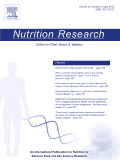
NUTRITION RESEARCH
Advancing the Science of Nutrition for Better HealthNUTRITION RESEARCH, published by PERGAMON-ELSEVIER SCIENCE LTD, stands as a pivotal platform for the dissemination of groundbreaking research in the fields of nutrition, dietetics, and endocrinology. With an established track record since 1981, the journal has successfully converged its academic purview into 2024, providing a continuous source of high-impact studies that address critical issues in human health and nutrition. Recognized as a Q2 journal in multiple relevant categories, including Endocrinology and Nutrition, as well as boasting respectable Scopus rankings, it serves a diverse audience of researchers, professionals, and students eager to enhance their understanding of nutritional science. Although the journal does not operate on an open access model, its contributions are invaluable, fostering advancements and collaboration within the scientific community dedicated to improving dietary practices and outcomes. The current address of the journal is THE BOULEVARD, LANGFORD LANE, KIDLINGTON, OXFORD OX5 1GB, ENGLAND, positioning it at the heart of global research initiatives.

Nutrition & Metabolism
Exploring the Dynamic Interplay of Nutrition and MetabolismNutrition & Metabolism, published by BMC, is a leading open-access journal that has been pivotal in advancing research within the domains of nutrition, metabolic science, and endocrinology since its inception in 2004. With an impressive impact in its field, this journal boasts classification in the Q1 category in both Nutrition and Dietetics and Medicine (miscellaneous), as well as Q2 in Endocrinology, Diabetes and Metabolism for 2023. It ranks in the top percentiles of its Scopus categories, highlighting its significance to the scholarly community, with notable placements such as rank 22 out of 140 in Nutrition and Dietetics. The journal's commitment to open access ensures that groundbreaking research is readily available to researchers, practitioners, and students alike, fostering collaboration and innovation across disciplines. Based in the United Kingdom, Nutrition & Metabolism continues to shape the future of nutritional science and metabolic studies, inviting submissions that address pivotal questions and drive the field forward.
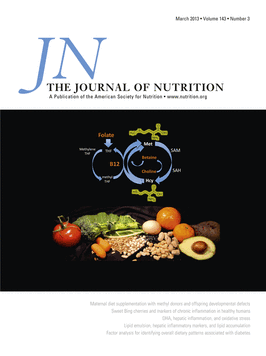
JOURNAL OF NUTRITION
Connecting researchers to the future of nutrition.JOURNAL OF NUTRITION is a premier academic journal published by Elsevier Science Inc, dedicated to advancing the understanding of nutritional science and its impact on health. With a long-standing tradition since its inception in 1945, the journal provides a vital platform for high-quality research, featuring articles that cover a wide range of topics within the fields of Medicine and Nutrition and Dietetics. Recognized for its significant contributions, the journal holds an impressive impact factor, with a Q1 rank in both Medicine (miscellaneous) and Nutrition and Dietetics as of 2023, positioning it among the top tier of scholarly publications in these disciplines. The Scopus Rankings further validate its status, boasting a rank of #57/398 in Medicine and #30/140 in Nutrition, indicating its influential presence in the research community. Although it operates under a traditional access model, the journal actively engages with a global audience of researchers, professionals, and students by disseminating cutting-edge insights designed to inform nutrition policy and practice. By focusing on current trends, innovative methodologies, and evidence-based nutrition strategies, the JOURNAL OF NUTRITION continues to be an essential resource for those committed to enhancing health through nutrition.

BMC Nutrition
Championing Open Access to Nutritional ExcellenceBMC Nutrition, published by BMC in the United Kingdom, is a premier open-access journal dedicated to disseminating high-quality research in the fields of nutrition, dietetics, public health, and associated medical disciplines. With its E-ISSN 2055-0928, the journal has been providing a platform for innovative studies since its inception in 2014, ensuring wide accessibility for researchers and practitioners alike. Reflecting its growing impact in academia, BMC Nutrition has achieved notable rankings within various categories, including Q2 in Medicine (miscellaneous) and Public Health, as well as Q3 in Nutrition and Dietetics, demonstrating its relevance and connection to key health sectors. The journal's diverse scope encompasses critical issues related to dietary practices, nutritional guidelines, and the impacts of nutrition on health outcomes, making it an essential resource for those engaged in nutritional research and policy-making. With a commitment to advancing the science of nutrition and fostering collaborations across disciplines, BMC Nutrition remains dedicated to enhancing the understanding of diet-related issues globally.
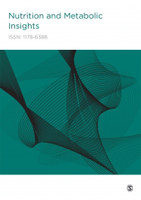
Nutrition and Metabolic Insights
Transforming research into practical health solutions.Nutrition and Metabolic Insights is a distinguished open-access journal published by SAGE Publications Ltd, dedicated to advancing the fields of nutrition, metabolic processes, and dietary sciences. Since its inception in 2008, this journal has carved a niche for itself within the academic community, offering a platform for rigorous research and innovative findings. With a focus on multidisciplinary approaches, it publishes articles that explore vital aspects of Endocrinology, Diabetes and Metabolism, Food Science, and Nutrition and Dietetics, earning recognition with a 2023 Q2 ranking in Food Science and Q3 rankings in other critical categories. Researchers and professionals can access cutting-edge research that not only contributes to academic discourse but also informs clinical practice and public health discussions. By facilitating the dissemination of knowledge, Nutrition and Metabolic Insights plays a crucial role in improving health outcomes worldwide, making it an essential resource for students, researchers, and health professionals alike.
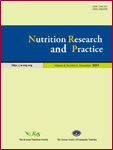
Nutrition Research and Practice
Fostering interdisciplinary dialogue in nutrition science.Nutrition Research and Practice is a prominent journal dedicated to advancing the field of nutrition and dietetics, published by the esteemed Korean Nutrition Society. With a focus on high-quality research and practical applications, this journal serves as a vital platform for scholars and professionals to disseminate new findings in the interdisciplinary realms of food science and nutrition. The journal boasts an impressive 2023 impact factor, categorizing it in the Q2 quartile in Food Science and Q3 in Nutrition and Dietetics, illustrating its significant reach and impact among peers. Despite being a non-open access publication, it continues to draw attention with its rigorous peer-review process, ensuring that only the most relevant and innovative contributions are shared. With coverage from 2010 to 2024, the journal not only supports a wealth of research but also aims to influence dietary practices and policies in South Korea and globally. Located in the heart of Seoul, Nutrition Research and Practice is an essential resource for researchers, practitioners, and students seeking to deepen their understanding of nutrition and improve public health outcomes.
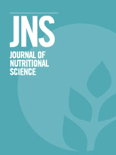
Journal of Nutritional Science
Promoting open access to vital nutrition research.The Journal of Nutritional Science, published by Cambridge University Press, is a leading open-access journal dedicated to the field of nutrition and dietary research. Established in 2012, this journal aims to disseminate high-quality research on nutrition, dietetics, and their implications for health and disease. With an impact factor reflective of its growing importance—holding Q2 and Q3 rankings in relevant categories such as Nutrition and Dietetics and Endocrinology—the journal serves as a vital platform for researchers, professionals, and students interested in evidence-based advancements within the nutritional sciences. The Journal of Nutritional Science is based in the United Kingdom and leverages a global network of experts to foster discussions that drive innovation in food science and health policies. By enabling open access to its content, it ensures that critical knowledge is readily available to the academic community and beyond, promoting a healthier, more informed society.
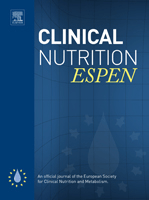
Clinical Nutrition ESPEN
Driving Innovation in Nutrition for Healthier FuturesClinical Nutrition ESPEN is a distinguished journal published by ELSEVIER, focusing on the critical intersection of clinical nutrition and metabolic health. With an ISSN of 2405-4577, this journal serves as an essential resource for researchers, practitioners, and students in the fields of Endocrinology, Diabetes and Metabolism as well as Nutrition and Dietetics. Operating out of the United Kingdom, it has garnered a respectable Q2 ranking in both categories for 2023, indicating its significant impact and relevance in the field. Although it does not follow an open access model, the journal offers valuable insights into contemporary nutrition research, clinical practices, and dietary interventions, making it a vital tool for those committed to improving patient outcomes through nutritional science. In its evolving journey, covering work from 2015 to 2024, Clinical Nutrition ESPEN continues to shape the dialogue in nutrition research, addressing pressing health challenges and fostering innovation in dietetic practice.

Nutrition Journal
Fostering Collaboration for a Nutritionally Informed World.Nutrition Journal is a prestigious open-access publication from BMC, dedicated to advancing the field of nutrition and dietetics since its inception in 2002. With an impressive impact factor and a notable Scopus ranking, it ranks in the top quartile (Q1) in both Medicine (miscellaneous) and Nutrition and Dietetics, highlighting its significant contribution to health sciences. Based in the United Kingdom, the journal covers a broad spectrum of topics, making it an essential resource for researchers, healthcare professionals, and students interested in nutrition's role in health and disease prevention. The journal not only facilitates the dissemination of groundbreaking research but also prioritizes accessibility, allowing global audiences to engage with vital findings that shape dietary practices and public health policies. With a commitment to interdisciplinary collaboration, Nutrition Journal fosters an environment where innovative ideas and evidence-based solutions can flourish, making it a cornerstone reference in the field.
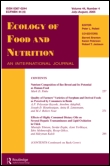
ECOLOGY OF FOOD AND NUTRITION
Unveiling the Complexities of Food and Ecological SystemsECOLOGY OF FOOD AND NUTRITION is a premier academic journal published by Taylor & Francis Inc, focusing on the intricate relationships between food systems, ecology, and nutrition. With an ISSN of 0367-0244 and an E-ISSN of 1543-5237, this journal has been a vital platform for scholarly communication since its inception in 1971, and it will continue to disseminate impactful research until at least 2024. Operating from the United Kingdom, it holds a distinguished position with a Q2 ranking in both Ecology and Food Science, along with a Q3 ranking in Medicine (miscellaneous) for 2023. Notably, its Scopus rankings reflect its influence in the fields of Environmental Science and Medicine, making it a crucial resource for researchers and professionals seeking to explore the interactions between ecological systems and nutritional practices. While the journal is not open access, it provides vital insights and findings that contribute to advancements in sustainability, health, and food security. As interdisciplinary research continues to grow, ECOLOGY OF FOOD AND NUTRITION remains essential for anyone interested in the future of food and environmental health.